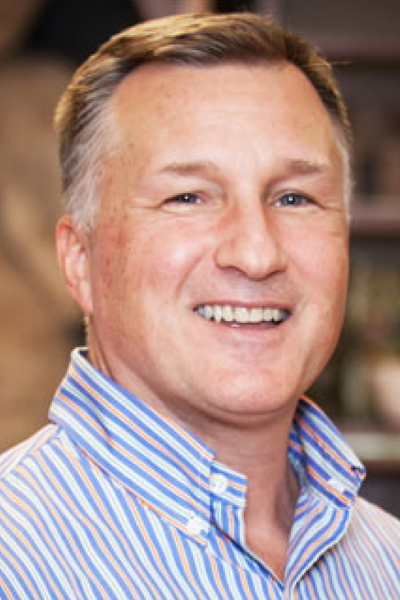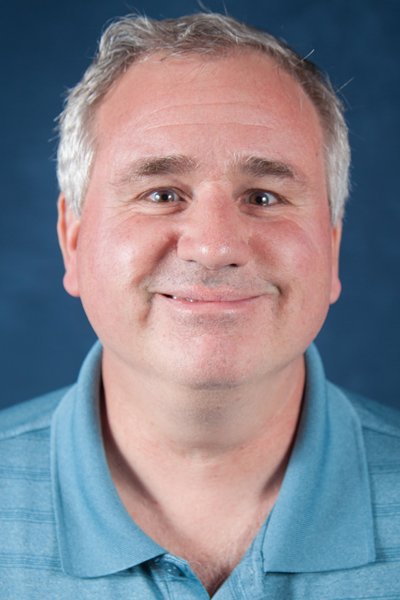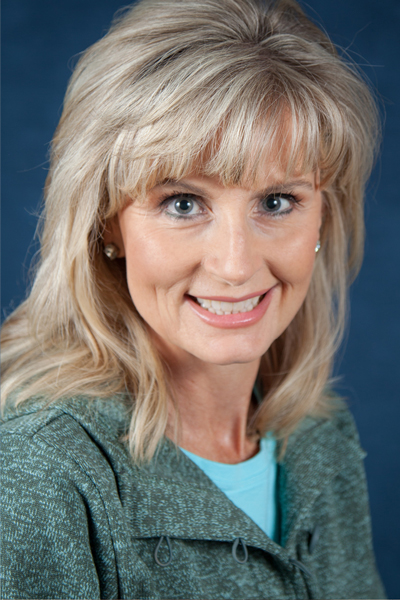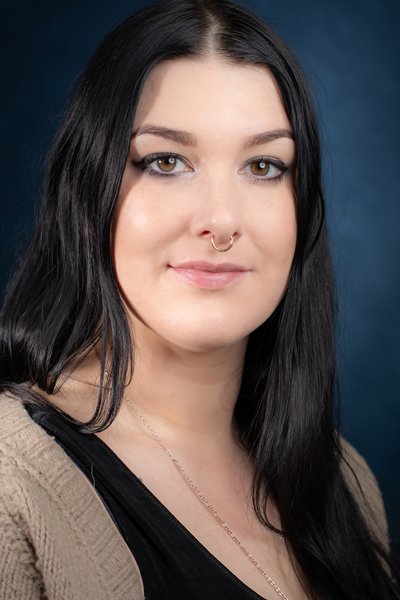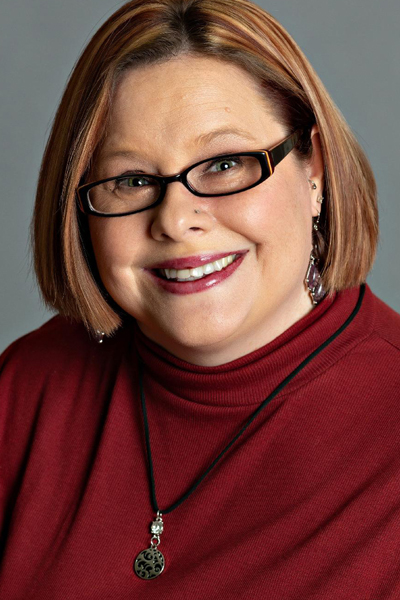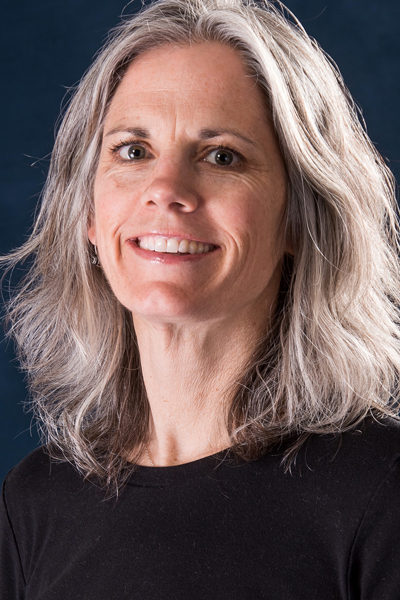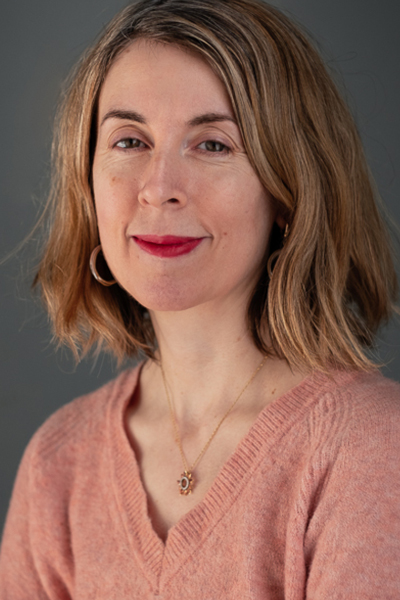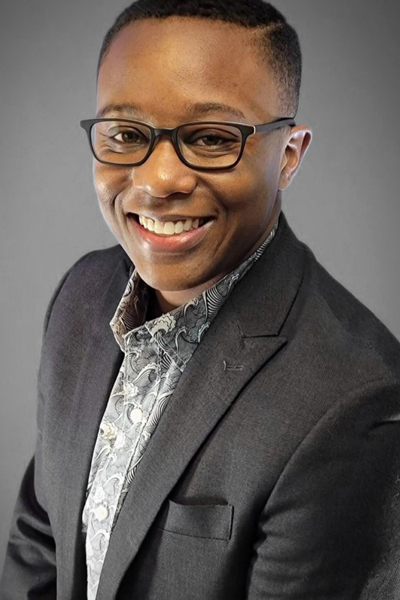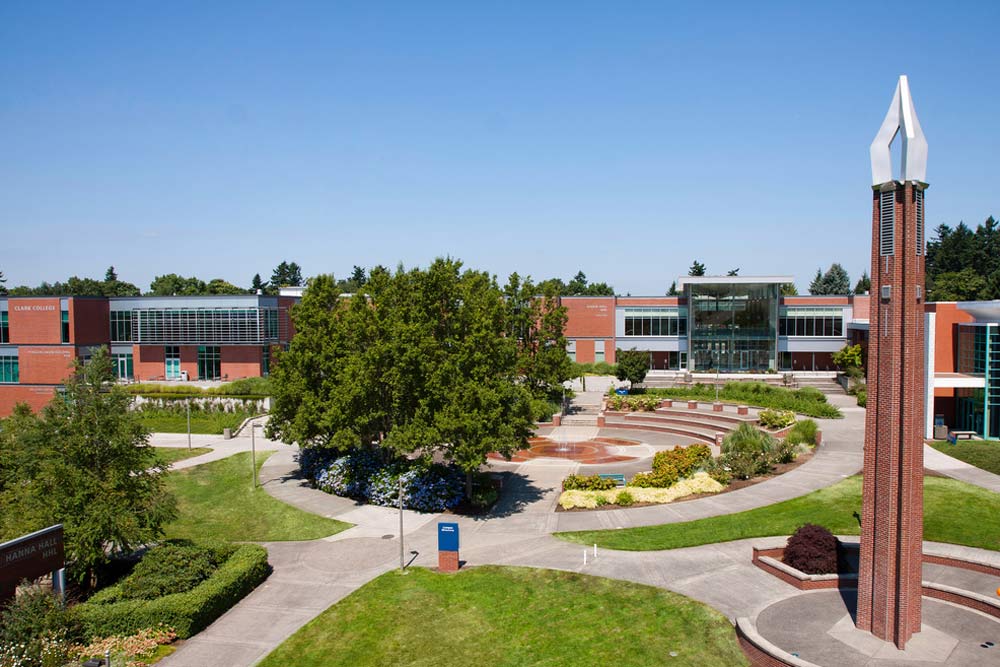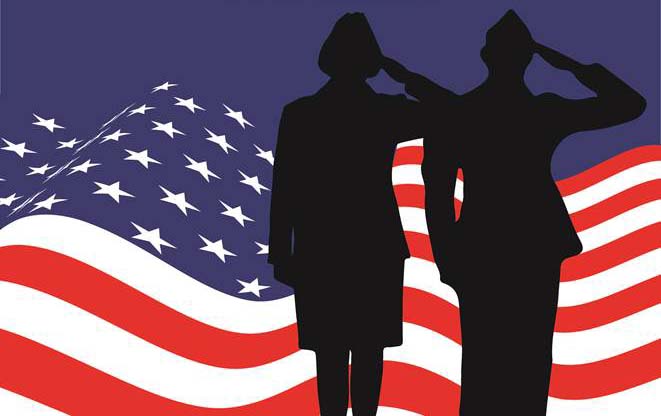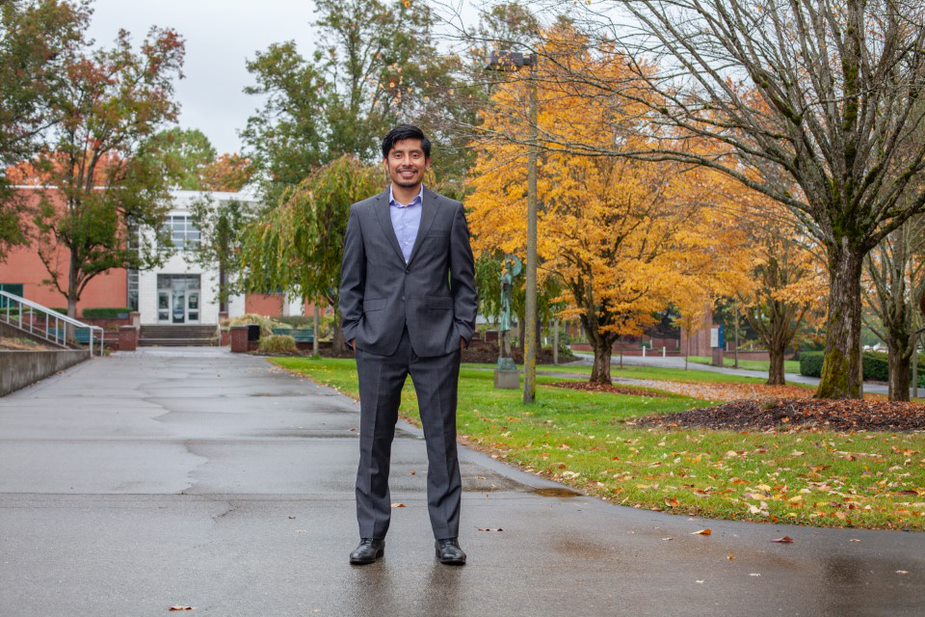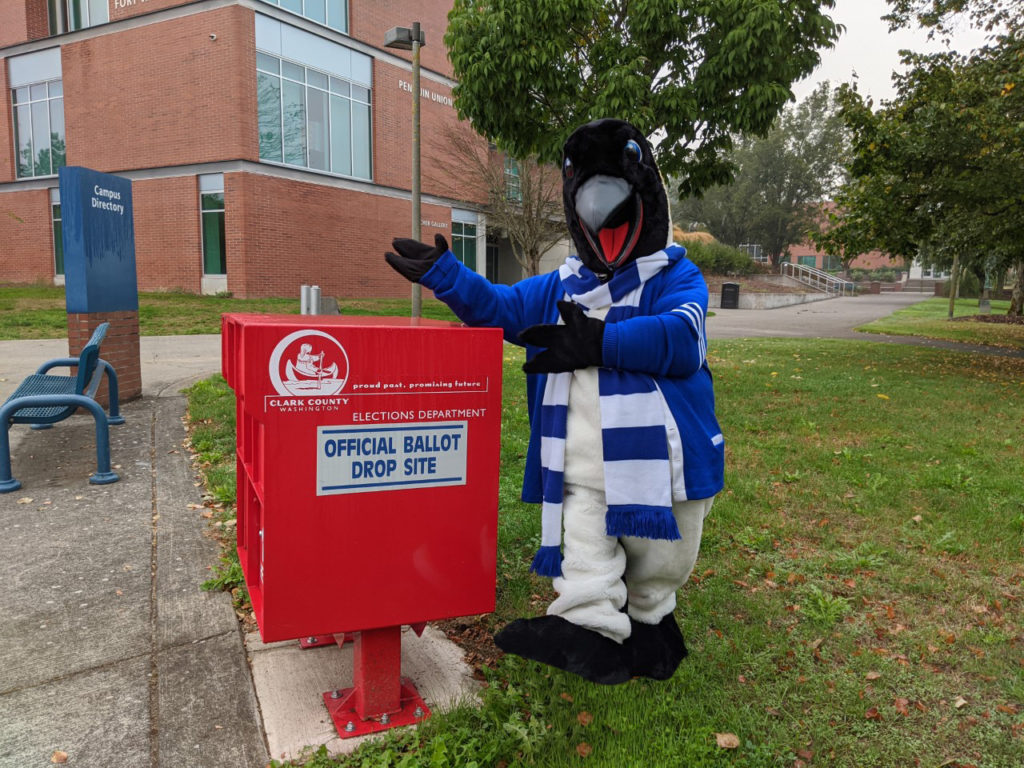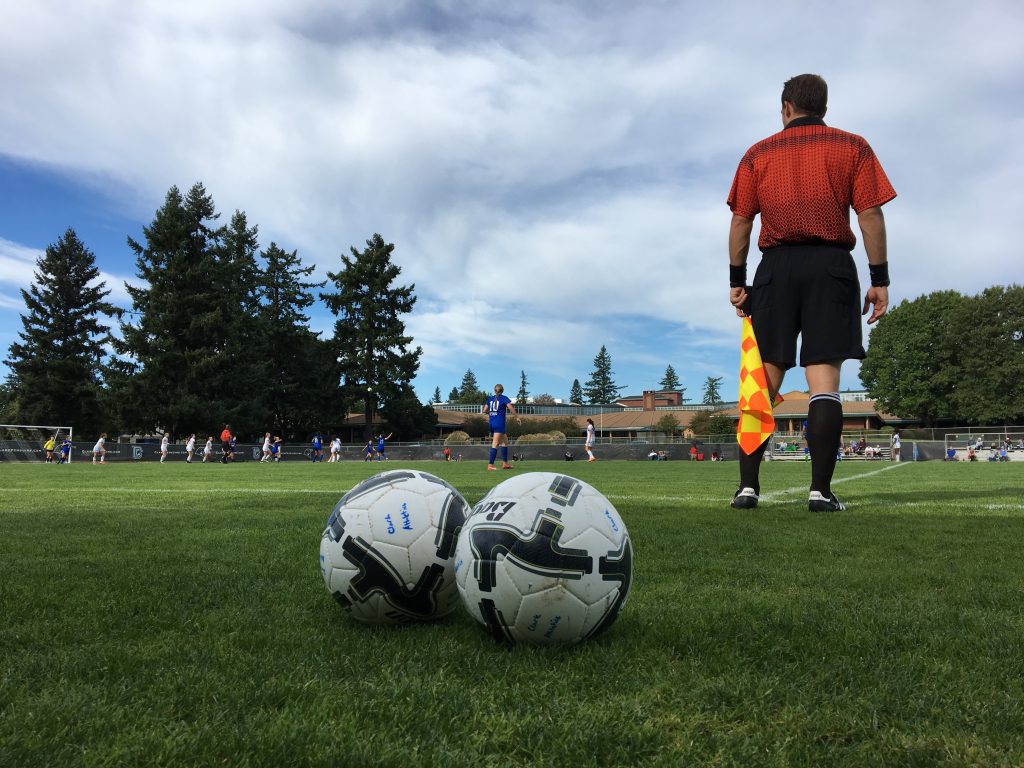Welcome, Professors!

Twelve outstanding educators are the newest members of the tenured faculty at Clark College. Joseph Cavalli (history), Mark Eddinger (mathematics), Amy Ewing Johnson (dental hygiene), Melissa J. Favara (English), Tyler H.J. Frank (career and academic preparation), Doug Harris (music), Christina Howard (biology), Dr. Sarah Kuzera (medical assisting), Dr. Michelle Mayer (mathematics), Kristin Sherwood (College 101), Beth Slovic (journalism), and Christina Smith (English) were all granted tenure during the Clark College Board of Trustees meeting on March 10. They will be honored at a college reception later in the spring.
Tenure is awarded by the college’s Board of Trustees based on professional excellence and outstanding abilities in their disciplines. The granting of tenure is based on the recommendations of tenure review committees to the vice president of instruction, which are then forwarded to the president, who presents a final recommendation to the Board of Trustees. Recommendations are based on self-evaluations, tenure review committee evaluations, student evaluations, supervisory evaluations, and peer evaluations. The final decision to award or withhold tenure rests with the Board of Trustees.
About the faculty members
Joseph Cavalli, history
Joseph Cavalli holds a Bachelor of Arts degree in history from Portland State University and a Master of Arts in history degree from University of Portland. He has experience teaching in private high schools in Croatia, Italy, the Kingdom of Bahrain, and Portland, Oregon. He has also taught history at University of Maryland College Park and Mt. Hood Community College, in addition to his experience teaching history at Clark College since 2006.
At Clark College, he has served as program director for the college’s Model United Nations team since 2011. He is also a popular instructor in Clark’s non-credit Mature Learning program and in 2016 received the college’s prestigious Exceptional Faculty Award.
“My approach to history is best summed up by the American historian John Tracy Ellis: ‘History is the rediscovery of the past in an enlightened manner,’” said Cavalli. “I am always striving to make history applicable to my students’ everyday lives in a way that piques their interest and curiosity.”
Mark Eddinger, mathematics
Mark Eddinger earned his Bachelor of Science degree in electronics engineering technology from DeVry Institute of Technology and his Master of Science in mathematics from Western Washington University. He began his career as a quality engineer at a manufacturer of lighting control systems before spending a decade teaching English as a foreign language in Japan. In addition to this work experience, he has taught math at the college level for 11 years.
At Clark College, Eddinger serves on the Math Events Committee, as well as on the team that has developed, improved, and supported a new math pathway for non-STEM majors. He has also designed Canvas courses that promote inclusion and shares them with his colleagues.
“I am committed to being a fellow journeyer with my students as we nurture our growth mindsets, as we learn how to make a more effective effort, and as we develop a passion for more thorough understanding of both math and the many academic disciplines that connect to math,” he said, adding, “They all connect.”
Amy Ewing Johnson, dental hygiene
Amy Ewing Johnson attended Indiana University’s School of Dentistry, where she earned three degrees: an Associate in Science in dental hygiene, a Bachelor of Science in public health dental hygiene, and a Master of Science in education. She has more than 30 years of work experience in dental settings.
At Clark College, Ewing Johnson serves as lead instructor and coordinator for all clinical and lab operations related to junior-year students. She is involved in dental hygiene study clubs, and continues to improve her own learning by attending state and national conferences.
“My teaching philosophy is all about making students feel safe to learn through experimentation, question/answer, as well as confident enough to learn via discussions and active learning opportunities,” said Ewing Johnson. “I believe in creating a warm and relaxed classroom community and work to communicate an enthusiasm of support for every student, as they strive to complete their academic goals.”
Melissa Favara, English
Melissa Favara earned her Bachelor of Arts degree in English with a creative writing emphasis from Western Michigan University and her Master of Arts degree in English from The Pennsylvania State University.
Favara joined the faculty at Clark College in 2007, first as an adjunct and then as a full-time temporary instructor. She served as the college’s Academic Early Warning liaison from 2009 to 2020. She currently assists in training fellow English faculty members on the college’s new co-requisite teaching model to serve its most at-risk students; she has previously taught in the Integrated Basic Education and Skills Training program and has presented at national conferences on Clark’s work in both practices.
Favara described her teaching philosophy as follows: “I meet students where they are and engage them in learning opportunities that honor their experience while offering chances to gain and apply knowledge in ways that they can transfer to new school, work, and life challenges.”
Tyler Frank, career and academic preparation
Tyler Frank earned his Associate in Arts transfer degree from Grand Rapids Community College; his Bachelor of Arts degree in history from the University of Michigan; and his Master of Arts degree in reading and culture from the University of Arizona. He served as a youth development facilitator for the U.S. Peace Corps in Huallanca, Peru, and has previous teaching experience at Pima Community College in Tucson, Arizona.
Since joining the faculty at Clark College in 2018, Frank has involved himself deeply in the college’s work. He has developed a fully online version of the CAP 42 (Integrated Math and Science) course, developed Open Educational Resources (OER), and led the outcomes assessment for CAP mathematics faculty. He also leads the “Anti-Racists Curriculum and Instruction” subgroup of the college’s White Anti-Racism Education Employee Resource Group.
“As a teacher, I prioritize creating a safe and welcoming environment for my students, where we all feel comfortable enough to explore new ideas, make mistakes, and share our discoveries and confusions with one another,” said Frank in describing his teaching philosophy.
Doug Harris, music
Doug Harris earned his Bachelor of Music in music education degree from the University of Florida, after which he continued his education at the University of Northern Colorado, earning both his master’s and doctoral degrees in music there. He has directed bands at multiple middle and high schools, as well as at Santa Clara University and Western Kentucky University.
Since joining the faculty at Clark College in 2018, he has led the college’s concert band, jazz band, and pep band, as well as directing its annual Jazz Festival.
“I strive to help each student achieve their potential through positive reinforcement within a rigorous curriculum,” Harris said in describing his teaching philosophy.
Christina Howard, biology
Christina Howard attended Portland State University, where she earned both her Bachelor of Science degree in biology and her Master of Science degree in behavioral neuroendocrinology. She has teaching experience at Portland State University and Portland Community College, and served as Lead Instructor of Human Anatomy and Physiology at the National College of Technical Instruction’s College of Emergency Services. She joined the faculty at Clark College in 2018.
At Clark, Howard serves as an event runner for the annual Science Olympiad, as well as co-lead advisor for cadaver dissection.
“My teaching philosophy is to help students find wonder in the biological sciences, specifically the study of the human body,” she said. “I employ an evidence-based and applied-learning approach to engender deep learning and curiosity for the subject matter, so that students can show mastery and better understand how biology applies to them.”
Dr. Sarah Kuzera, medical assisting
Dr. Sarah Kuzera earned her Associate in Applied Science in medical assisting from Springfield College; her bachelor’s degree in management from Everest College; her Master of Business Administration degree from Bryan University; and her Doctor of Education degree from Capella University. She holds certifications through the American Association of Medical Assistants and the American Medical Technologists. She has six years of work experience as a certified medical assistant in a variety of practices and clinics. She has nine years of experience teaching in post-secondary environments.
Since joining the faculty at Clark College in 2017, Dr. Kuzera has served the college in many roles. She developed a Medical Assisting Club at the college and served on a Guided Pathways Pillar One work group. She has served on the Evergreen School District’s Medical Science Advisory Board and participated in Clark College’s Instructional Planning Team and Curriculum committees.
“I believe that teaching should always be student-centered and I should facilitate the teaching environment,” Dr. Kuzera said. “My role as an instructor is to provide students, through my experiences and expertise, the necessary resources for them to produce learning and foster critical thinking. I have always been flexible in my teaching strategies to adapt to the needs of the adult learner.“
Dr. Michelle Mayer, mathematics
Michelle Mayer earned her Bachelor of Science degree in mathematics from George Fox University in Newberg, Oregon. She continued her education at Texas Tech University, where she earned both a master’s and a doctorate degree in mathematics. She has previous teaching experience at Texas Tech University and Pacific University.
Since joining the Clark College faculty in 2018, Dr. Mayer has become the course co-coordinator for the applied algebra courses MATH 092 and MATH 096.
“My approach to teaching is to present the material with clarity and accessibility; create an open environment where students feel comfortable asking questions and interacting with me; and to challenge my students to think critically while giving them the support they need to succeed,” said Dr. Mayer.
Kristin Sherwood, College 101
Kristin Sherwood earned her bachelor’s degree from Lewis & Clark College and her master’s degree in public administration from Portland State University. She has previous work experience as the Community Service Coordinator at Lewis & Clark College and as the Outreach Coordinator for the City of Vancouver’s Community Services Department. In 2003, she began teaching in the human development department of Clark College; ten years later, she began serving as the coordinator of the College 101 course, which provides guidance to incoming college students.
At Clark College, Sherwood serves on the Foundation Scholarship Selection Committee, the MyPlan Work Group, and the Guided Pathways Advisory Committee. She also regularly presents in the Student Success Workshops presented through Career Services.
“I aspire to empower, engage, and encourage my students with knowledge and resources to support their academic success,” said Sherwood in describing her teaching philosophy. “I do this by developing rapport, making sincere connections, providing timely and thoughtful feedback, and maintaining a genuine commitment to my classes.”
Beth Slovic, journalism
Beth Slovic earned her bachelor’s degree from Amherst College and her master’s degree from Columbia University. She has work experience as an editorial assistant at a nonprofit book publisher and as a print journalist at the Bozeman Daily Chronicle, Willamette Week, the Oregonian, and the Portland Tribune. For the past 13 years, she has worked as an occasional stringer for the New York Times, and she freelances regularly for Portland Monthly and PDX Parent magazines. She has previous teaching experience at Clackamas Community College, Portland State University, and the University of Portland.
Since joining the Clark College faculty in 2018, she has become the journalism advisor to the Clark College Independent. She also serves as president of the Pacific Northwest Association of Journalism Educators.
“I believe journalism is a framework for talking about skills and concepts that serve students in wider pursuits,” Slovic said of her teaching philosophy. “My students seek answers to questions and communicate across multiple platforms, making them the ‘communicorns’ of the future.”
Christina Smith, English
Christina Smith earned her Bachelor of Arts degree in English from McDaniel College and her Master of Arts degree in rhetoric and writing studies from the University of Utah. She has previous teaching experience at the University of Utah.
Since joining the faculty of Clark College in 2015, Smith has served on several committees and work groups, including the Vice President of Instruction Hiring Committee, the Vice President of Diversity, Equity and Inclusion Hiring Committee, the Tenure Review Equity Committee, the Women’s Studies Scholarship Review Committee, the Clark College Forms Committee, and the Student Code of Conduct Policy and Training Work Group. Additionally, she has presented at both the Queer Student Luncheon and the “Discovering College Confidence” workshop.
“My approach to teaching is what I would call adaptive, holistic, and rhetorical,” said Smith. “Adaptive teaching means discovering how each student learns and processes information, as this will let me find the appropriate teaching methods and tools to successfully communicate course content. This adaptability also speaks to my holistic approach to instruction. I believe it is important to engage the whole person, not just the student-mind that is present in my course; this means providing supports that address their personal needs while simultaneously challenging them as learners.”
